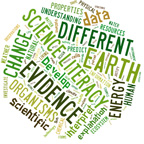You are here
Online Resources for Science Literacy
According to the United States National Center for Education Statistics, "scientific literacy is the knowledge and understanding of scientific concepts and processes required for personal decision making, participation in civic and cultural affairs, and economic productivity."
The resources provided on this website are intended to provide a quick access list for educators to use in a way that supports their instructional planning. Provided resources should be previewed and used with teacher discretion. Because this page contains resources outside of the CDE website, CDE cannot control changes in outside content and listing these resources does not indicate an endorsement by the Colorado Department of Education.
AAAS Project
The recommendations at each grade level suggest reasonable progress toward the adult science literacy goals laid out in the project's 1989 report Science for All Americans. Benchmarks can help educators decide what to include in (or exclude from) a core curriculum, when to teach it, and why.
Annenberg Foundation Learner Modules in Literacy
See modules 9-12 on the right hand panel for specific elements of science literacy.
Appendix M of NGSS
Crosswalk between the Science and Engineering Practices of NGSS and Common Core Standards
Argumentation in History and Science (Kate McNeil)
This professional development class will focus on how to support students in engaging in argumentation in both history and science using the claim, evidence and reasoning (CER) framework. Specifically, we will explore how evidence and reasoning are similar and different across history and science as well as how to provide appropriate scaffolds and instructional supports to help students gain greater expertise in argumentation in reading, writing and talking.
DOGO Media
A next-generation online network empowering kids to engage with digital media in a fun, safe and social environment. “DOGO” means young or small in Swahili. While our young fans may be small, they act BIG as they engage with our websites and express their opinions on the content that interests and inspires them.
LDC Toolkit
The Literacy Design Collaborative (LDC) offers a research based approach to incorporating literacy into all areas of content in grades K-12 by providing a common framework that facilitates teacher creativity and builds literacy skills across content areas.
Newsela
Read closely. Think critically. Be worldly. Newsela is an innovative way to build reading comprehension with nonfiction that’s always relevant: daily news. It’s easy and amazing. Every Article At 5 Levels making it easy for an entire class to read the same content, but at a level that’s just right for each student.
Scientific Literacy
National Academies Press, Perspectives and Terms in the National Science Education Standards
Supporting Claim, Evidence and Reasoning (Kate McNeil)
Presentation of the Claims, Evidence and Reasoning (CER) Framework as it applies to national standards.
For further assistance, please contact:



Connect With Us





